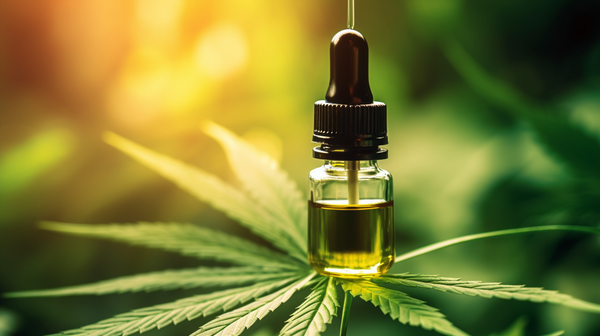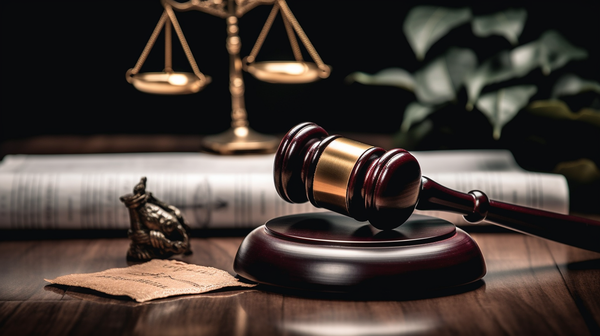"THE ULTIMATE GUIDE TO CBD AND THC: BENEFITS, EFFECTS, AND LEGALITIES"
The world of cannabis is rich and complex, with CBD (Cannabidiol) and THC (Tetrahydrocannabinol) standing at the forefront due to their significant impacts and widespread interest. These compounds, while sharing the same botanical origin, diverge in their effects, applications, and legal standings, painting a multifaceted picture of cannabis's role in both medical and recreational spheres.

Introduction to the Cannabis Compounds
Cannabis, a plant shrouded in both controversy and reverence, harbors over a hundred cannabinoids, with CBD (Cannabidiol) and THC (Tetrahydrocannabinol) standing out due to their significant effects and widespread popularity.
Despite originating from the same plant, their impact on the human body diverges due to slight differences in their molecular structures. These differences are crucial, influencing how each interacts with the body's endocannabinoid system, leading to varying outcomes. For an in-depth look at their molecular makeup, this scientific comparison provides valuable insights.
The Psychoactive Differences
THC is synonymous with the psychoactive "high" associated with cannabis use. This effect is due to THC's affinity for binding to the CB1 receptors in the brain, altering normal brain communication and leading to euphoria or the feeling of being "high."
On the contrary, CBD does not bind as readily to these receptors, thus not inducing psychoactive effects. Instead, CBD is known to counteract some of THC's psychoactive effects by blocking THC's access to CB1 receptors. This key difference makes CBD appealing for those seeking the therapeutic benefits of cannabis without the altered mental state. For a deeper understanding of their interaction with the brain, explore this detailed analysis.
The Therapeutic Landscapes of CBD and THC
In exploring the therapeutic landscapes of CBD and THC, it's essential to delve into the realm of chronic pain management, an area where both compounds have shown promising potential. Research indicates that THC can significantly alleviate chronic pain by binding to cannabinoid receptors in the brain and altering pain perception pathways.
CBD contributes by reducing inflammation and interacting with neurotransmitters, which are key in pain management. This dual approach offers a beacon of hope for individuals suffering from chronic conditions such as arthritis and multiple sclerosis.
For those interested in the scientific underpinnings of these effects, a comprehensive review can be found in the Journal of Pain Research ([Pain Research Link]), which sheds light on the intricate mechanisms through which these compounds exert their analgesic effects.
The Role of CBD and THC in Mental Health
Another compelling aspect of CBD and THC is their role in mental health, particularly in the treatment of conditions like depression and PTSD. The way THC stimulates the release of dopamine in the brain can produce euphoric effects, which may temporarily alleviate symptoms of depression.
CBD, on the other hand, has been shown to exert antidepressant effects through its action on serotonin receptors, a critical neurotransmitter involved in mood regulation.
The nuanced understanding of how these compounds can be harnessed to support mental health is continuously evolving, with a wealth of information available through resources like the American Journal of Psychiatry ([Psychiatry Link]), where recent studies delve into the psychiatric implications of cannabis-derived compounds.
The Conversation Around CBD and THC
The conversation around CBD and THC wouldn't be complete without addressing their neuroprotective properties, which have sparked interest in the context of neurodegenerative diseases such as Alzheimer's and Parkinson's.
The antioxidant properties of CBD, in particular, have been noted for their potential to combat oxidative stress and inflammation, key contributors to neurodegeneration. Meanwhile, THC's ability to modulate neurotransmitter activity presents a possible avenue for mitigating some of the symptomatic cognitive decline associated with these diseases.
The exploration of cannabis compounds as neuroprotective agents is ongoing, with promising insights offered by publications like the Journal of Neurochemistry ([Neurochemistry Link]), which provides a detailed analysis of current research in this area.
Exploring Medical Benefits
CBD and THC both boast a range of medical benefits, albeit with some distinctions. CBD is widely recognized for its potential in treating various conditions without inducing psychoactive effects. Its applications include but are not limited to:
- Anxiety and depression relief
- Seizure control, particularly in conditions like epilepsy
- Inflammation and pain reduction
- Alleviating symptoms of neurodegenerative diseases
THC, despite its psychoactive properties, also offers significant medical benefits, particularly in:
- Pain management, especially chronic pain
- Appetite stimulation, crucial for patients undergoing chemotherapy
- Sleep aid, benefiting those with insomnia
- Relief from nausea and vomiting
The nuances of these benefits, backed by scientific studies, highlight the therapeutic potential of both compounds. For a comprehensive list of benefits and supporting research, visit this resource for CBD and this one for THC.

Side Effects and Considerations
While CBD is lauded for its mild side effect profile, THC's psychoactive properties can lead to temporary side effects such as memory impairment, red eyes, and coordination issues.
For those considering cannabis-based treatments, it's crucial to weigh these potential side effects against the therapeutic benefits. Responsible use, including starting with low doses and gradually increasing as needed, can help mitigate some of THC's less desirable effects.
CBD is generally well-tolerated, with fewer and milder side effects, such as fatigue, changes in appetite, and diarrhea in some individuals. For guidelines on responsible use, this article offers practical advice.
Additionally, being aware of the legal status of these compounds in your jurisdiction is essential. For more detailed information on side effects and guidelines for use, consult resources such as Mayo Clinic's overview on medical marijuana.

Navigating the Legal Labyrinth of CBD and THC Consumption
When considering the use of CBD or THC, it's crucial to navigate the intricate legal landscape that governs these substances. The legal status of CBD and THC varies significantly across different jurisdictions, with laws often changing rapidly.
In some regions, CBD derived from hemp may be legal, provided it contains less than 0.3% THC, as stipulated by federal law in the United States [more].However, THC and marijuana-derived CBD remain classified as controlled substances in many areas, subjecting users to potential legal risks.
It's imperative for consumers to stay informed about local and federal laws to ensure compliance and avoid legal complications. This involves researching state-specific regulations, keeping abreast of recent legal developments, and, when necessary, consulting legal counsel to fully understand the implications of CBD and THC consumption in their locale.
Conclusion
In conclusion, CBD and THC stand as pillars in the burgeoning field of cannabis research, each with its unique profile of effects, benefits, and legal considerations. While THC is known for its psychoactive properties, offering relief and comfort to many, CBD presents a non-psychoactive alternative, prized for its broad therapeutic applications without the high.
The nuanced interplay between these compounds, particularly when considered under the entourage effect, suggests a complex synergy that could unlock new avenues for treatment. As the legal and societal landscapes continue to evolve, so too will our understanding and utilization of these remarkable compounds.
Whether seeking relief from chronic conditions, managing symptoms of acute ailments, or exploring wellness alternatives, CBD and THC offer a spectrum of possibilities worth considering. With ongoing research and an informed, cautious approach, users can navigate the world of cannabis to find solutions that best fit their health and wellness goals.
Q&A Section
Q: What should first-time users know about CBD and THC?
A: First-time users should understand the key differences between CBD and THC, particularly THC's psychoactive effects versus CBD's non-psychoactive properties. Starting with low doses, especially with THC, to gauge individual response is crucial. Consulting with healthcare professionals, particularly for medical use, can provide personalized guidance. Awareness of the legal status of these compounds in your jurisdiction is essential. Finally, considering the method of consumption (edibles, oils, smoking) can significantly affect the experience.
Q: How do CBD and THC interact with the body?
A: CBD and THC interact with the body's endocannabinoid system but in different ways. THC binds directly to cannabinoid receptors, particularly CB1 receptors in the brain, leading to its psychoactive effects. CBD, on the other hand, does not bind directly to these receptors and is thought to work by influencing the body to use its own cannabinoids more effectively. This interaction affects various bodily functions, from mood and appetite to pain and inflammation, explaining the wide range of potential therapeutic effects.
Q: Can CBD or THC be used to treat anxiety?
A: Both CBD and THC have been studied for their potential in treating anxiety, but they work in different ways and may not be suitable for everyone. CBD is widely regarded for its anxiolytic properties without the psychoactive effects, making it more appealing for those wary of the 'high' associated with THC. Some studies suggest that THC, at lower doses, can also alleviate anxiety; however, higher doses may exacerbate it. It's important to consult healthcare professionals to tailor treatment to individual needs.
Q: Are there any legal concerns I should be aware of when using CBD or THC?
A: Yes, the legal status of CBD and THC varies significantly by location.(MARIJUANA LEGALITY BY STATE) CBD derived from hemp (with less than 0.3% THC) is legal in many places under certain regulations, but THC and marijuana-derived CBD face stricter legal restrictions due to their psychoactive effects. It's crucial to familiarize yourself with the laws in your jurisdiction regarding possession, use, and sale of these compounds to avoid legal complications.
Q: What is the 'entourage effect' and how does it relate to CBD and THC?
A: The 'entourage effect' is a theory that suggests compounds in cannabis, such as CBD and THC, work better together than they do in isolation. This synergy may enhance their effects and therapeutic potential. For example, CBD is thought to mitigate some of THC's less desirable effects, like anxiety and paranoia, while enhancing its pain-relief properties. This concept is a key argument for the use of full-spectrum cannabis extracts, which contain a broad range of cannabinoids and terpenes.
--
"Unlock the secret to organized and stylish cannabis storage with our premium stash boxes - visit our website now to discover your perfect match!"
--
|
More Articles here |
| "ELEVATE YOUR CANNABIS EXPERIENCE: A COMPREHENSIVE SMOKING GUIDE" |
| "CANNABIS AND DEMENTIA PREVENTION: EXPLORING THE NEUROPROTECTIVE POTENTIAL" |








